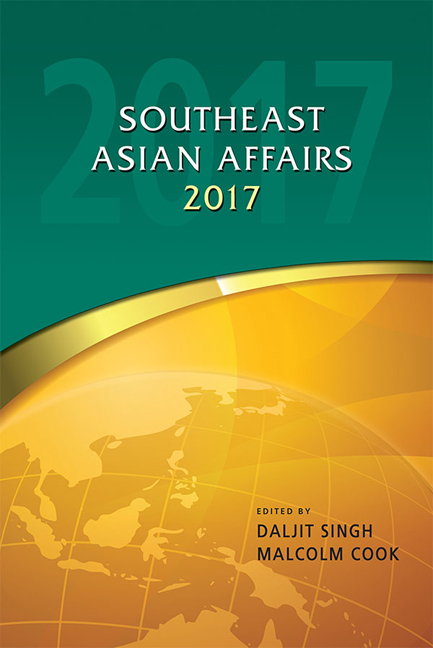Indonesia in 2016: Jokowi Consolidates Power
from INDONESIA
Published online by Cambridge University Press: 12 January 2018
Summary
After a difficult first year in office, President Joko Widodo (Jokowi) showed in 2016 that he has grown increasingly adept at manoeuvring through the maze of political and economic interests in Jakarta. For most of the year he continuously consolidated his power through a range of political manoeuvres that included the broadening of his governing coalition, a cabinet reshuffle, and the appointment of his preferred choice for police chief. Towards the end of the year, however, a new challenge emerged for Jokowi when his political opponents joined forces with Islamist hardliners to mobilize hundreds of thousands of protestors to demonstrate against Jakarta governor Basuki Tjahaja Purnama (Ahok), an ally of Jokowi, who faced politically motivated blasphemy charges. In terms of policy, the President and his reshuffled team focused much of their attention on economic matters, in particular the development of Indonesia's ailing infrastructure and the implementation of a tax amnesty law. Internationally, the need to attract more foreign investment and the rising tensions in the South China Sea prompted Jokowi to pay more attention to foreign policy than in his inaugural year.
All in all, the President tightened his grip on power in 2016, but challenges remain, not least because there is still a lack of coherence and clear direction in Jokowi's policymaking and personnel decisions. This chapter will highlight these seemingly contradictory features of Jokowi's second year in office through an analysis of some of the most significant events in Indonesian politics in 2016. First, it will provide an overview of domestic politics, which were dominated by Jokowi's quest to strengthen his governing coalition on the one hand and an ongoing slide towards religious and political conservatism on the other. Second, it will outline key trends in the Indonesian economy, emphasizing that Indonesia's GDP growth remained relatively flat compared to 2015 despite a number of ambitious economic reform initiatives aimed at stimulating investment and improving fiscal space. Third, the discussion will shift to foreign policy, where Indonesia attempted to be more assertive in its pursuit of tangible benefits yet remained constrained by its lack of military capabilities and effective diplomatic resources.
- Type
- Chapter
- Information
- Southeast Asian Affairs 2017 , pp. 149 - 162Publisher: ISEAS–Yusof Ishak InstitutePrint publication year: 2017

